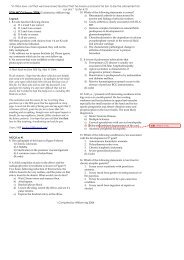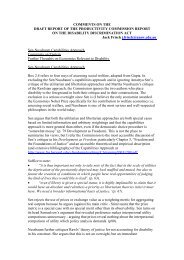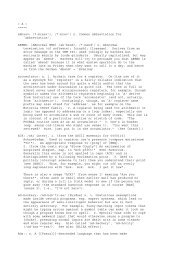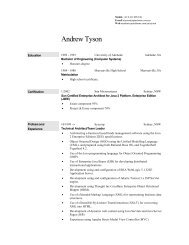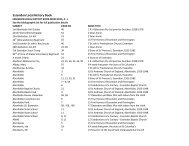Notes to Submission to the Productivity Commission Inquiry into the ...
Notes to Submission to the Productivity Commission Inquiry into the ...
Notes to Submission to the Productivity Commission Inquiry into the ...
You also want an ePaper? Increase the reach of your titles
YUMPU automatically turns print PDFs into web optimized ePapers that Google loves.
If <strong>the</strong> court accepts that costs can be passed on, it would presumably have <strong>to</strong> account for<strong>the</strong> cost impact on ZLK, and given <strong>the</strong> 75% fall in ZLK’s share price, an ‘extraordinary’cost impost could be viewed as involving ‘unjustifiable hardship’. An economicperspective would not find <strong>the</strong> his<strong>to</strong>rical share price fall as relevant <strong>to</strong> <strong>the</strong> value ofbuilding a new ramp, but arguably <strong>the</strong> DDA requires <strong>the</strong> court <strong>to</strong> account for <strong>the</strong> impac<strong>to</strong>n ZLK even though it is not a direct party in <strong>the</strong> dispute between Sandra and JaxxJazz,and if it does, <strong>the</strong> court could conceivably find that <strong>the</strong> construction of <strong>the</strong> ramp <strong>to</strong>involve ‘unjustifiable hardship’.The three viewpoints above highlight a number of issues which need <strong>to</strong> be clarified <strong>to</strong>minimise uncertainty and <strong>to</strong> enhance fairness, and <strong>the</strong>y also highlight how a project maybe frustrated by <strong>the</strong> details of <strong>the</strong> DDA and how a focus on financial expenditures andvaluations instead of economic costs and benefit can discourage economically efficientprojects.Economic analysis suggests that <strong>the</strong> incidence of a tax or cost impost varies according <strong>to</strong><strong>the</strong> capacity of consumers, producers and assets owners <strong>to</strong> find alternatives <strong>to</strong> <strong>the</strong> ‘taxed’good or service. This suggests that <strong>the</strong> incidence of a cost impost varies on a case by casebasis, and <strong>the</strong>refore for different types of complaints. Thus, while <strong>the</strong> nominal immediateincidence of improved access <strong>to</strong> buildings and transport may lie with transport opera<strong>to</strong>rs,<strong>the</strong> long-term incidence is likely <strong>to</strong> be born by asset owners and consumers as well asopera<strong>to</strong>rs; and similarly, <strong>the</strong> long-term incidence of anti-discrimination measures inemployment is likely <strong>to</strong> be shared by both employers and persons with disability (in <strong>the</strong>form of lower wage) and <strong>the</strong> long-term incidence of education access is likely <strong>to</strong> be bornby taxpayers and parents.ImplicationsIdeally, <strong>the</strong> DDA needs <strong>to</strong> be explicit in:• defining unjustifiable hardship as a cost-benefit exercise• defining <strong>the</strong> parameters of unjustifiable hardship• specifying that <strong>the</strong> ultimate long-term (as opposed <strong>to</strong> immediate nominal) incidenceof expenditure should be considered as <strong>the</strong> relevant criterion for defining hardship• specifying how <strong>the</strong> gains of people with disabilities should be weighted against <strong>the</strong>costs born by consumers, producers, taxpayers• specifying how consumer benefit is <strong>to</strong> be measured.Without refinement of <strong>the</strong> concept of unjustifiable hardship along <strong>the</strong> lines outlinedabove, <strong>the</strong> DDA will continue <strong>to</strong> be flawed ineffective legislation which raises <strong>the</strong> hopesof people with disability and gives <strong>the</strong> appearance of enhancing <strong>the</strong> rights of people withdisability without doing so. It will continue <strong>to</strong> be flawed because of <strong>the</strong> uncertainties indefinition, and it will continue <strong>to</strong> offer little advance because of <strong>the</strong> narrow immediate (asopposed <strong>to</strong> ultimate) financial (as opposed <strong>to</strong> economic) perspective that is likely <strong>to</strong> betaken in defining <strong>the</strong> cost burden.33



